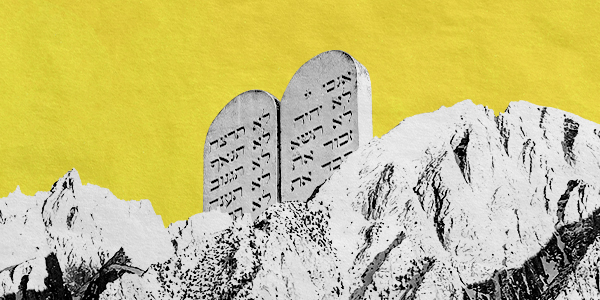 Identifying as a Jew
Identifying as a Jew


6 min read
Shavuot celebrates the receiving of the Torah at Mount Sinai.
Shavuot is a two day holiday that begins Thursday night, May 25, 2023. and ends on the evening of Saturday May 27 after nightfall. In Israel Shavuot is observed for one day also starting on and ending on the evening of Friday May 26, after nightfall.
It is ironic that Shavuot is such a little-known holiday, given that it commemorates the single most important event in Jewish history – the giving of the Torah at Mount Sinai.
Shavuot occurs on the 6th of Sivan, the culmination of a seven-week period, "counting of the Omer," that occurs following Passover. The very name "Shavuot" means "weeks," in recognition of the weeks of preparation and anticipation leading up to the Sinai experience. Since Shavuot occurs 50 days after the first day of Passover, it is sometimes known as "Pentecost," a Greek word meaning "the holiday of 50 days." (Shavuot, however, has no connection to the Christian Pentecost holiday.)
Three millennia ago, after leaving Egypt on the day of Passover, the Jews traveled into the Sinai desert. There, the entire Jewish nation – 3 million men, women and children – directly experienced divine revelation:
God spoke to you from the midst of the fire; you were hearing the sound of words, but you were not seeing a form, only a sound. He told you of His covenant, instructing you to keep the Ten Commandments, and He inscribed them on two stone tablets. (Deut. 4:12-13)
The giving of the Torah was an event of awesome proportions that indelibly stamped the Jewish nation with a character, faith and destiny. And in the 3,300 years since, the Torah’s ideals – monotheism, justice, responsibility – have become the moral basis for Western civilization. In the words of U.S. President Calvin Coolidge, "The Hebraic mortars cemented the foundations of American democracy."
Shavuot is a full-fledged Yom Tov, and as such carries most of the same restrictions as on Shabbat – no driving, no writing, etc. The exception is that food preparation (e.g. cooking) is permitted. In Israel, Shavuot lasts one day; outside of Israel it is two days.
Perhaps the reason for the relative obscurity of Shavuot is because this holiday has no obvious "symbols" of the day – i.e. no Shofar, no Sukkah, no Chanukah Menorah.
On Shavuot, there are no symbols to distract us from the central focus of Jewish life: the Torah. So how do we commemorate Shavuot? It is a widespread custom to stay up the entire night learning Torah. And since Torah is the way to self-perfection, the Shavuot night learning is called Tikkun Leil Shavuot, which means "an act of self-perfection on the night of Shavuot."
Those who study all night then say the morning prayers at the earliest permitted time – thus expressing the enthusiasm of the Jewish people to receive the Torah. Most synagogues and yeshivot will organize special classes and lectures throughout the night of Shavuot.
At synagogue services on Shavuot morning, we read the biblical book of Ruth. Ruth was a non-Jewish woman whose love for God and Torah led her to convert to Judaism. The Torah intimates that the souls of eventual converts were also present at Sinai, as it says: "I am making [the covenant] both with those here today before the Lord our God, and also with those not here today." (Deut. 29:13)
Ruth has a further connection to Shavuot, in that she became the ancestor of King David, who was born on Shavuot, and died on Shavuot.
On Shavuot, it is customary to decorate the synagogue with branches and flowers. This is because Mount Sinai blossomed with flowers on the day the Torah was given. The Bible also associates Shavuot with the harvest of wheat and fruits, and marks the bringing of the first fruits to the Holy Temple as an expression of thanksgiving. (see Exodus 23:16, 34:22, Numbers 28:26)
On Shavuot morning, the Yizkor memorial prayer for the departed is also said.
There is a universal Jewish tradition of eating dairy foods on Shavuot. Various reasons have been suggested, among them:
Make sure to participate in the strong tradition of eating dairy foods on Shavuot and check out our Shavuot food-related articles, such as: ‘Shavuot is The Holiday of Cheesecake and Blintzes’. Head over to our Jewlish section to discover more.
Pilgrimage to the Western Wall
In 1967, the Six Day War ended just a few days before Shavuot. Israel had reclaimed the Western Wall, and for the first time in 19 years Jews had access to the area surrounding the Temple Mount, Judaism's holy site. On Shavuot itself, the Western Wall first became open to visitors, and on that memorable day over 200,000 Jews journeyed by foot to the Western Wall. (In Jerusalem, no cars or buses run on Jewish holidays.)
In subsequent years, this "pedestrian pilgrimage" has become a recurring tradition. Early on Shavuot morning – after a full night of Torah learning – the streets of Jerusalem are filled with tens of thousands of Jews walking to the Western Wall.
This tradition has biblical precedence. Shavuot is one of Judaism's three main pilgrimage festivals, where the entire nation would gather in Jerusalem for celebration and study.
